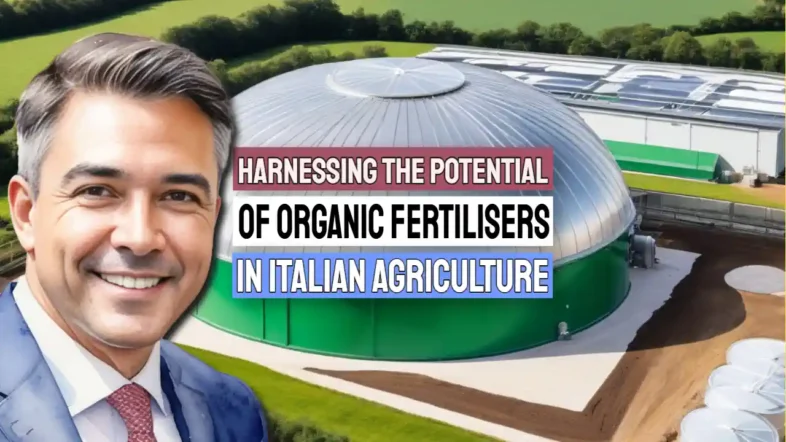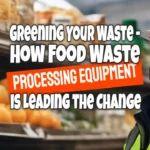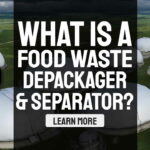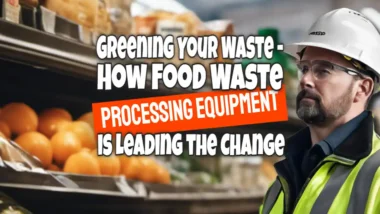Using Organic Fertilisers to their Full Potential in Italy's Farms
Nitrogen is a crucial element in agriculture, playing a vital role in plant growth and development. Italy, with its rich agricultural heritage and commitment to sustainable farming practices, has immense potential for the use of organic fertilisers in agriculture.
Organic fertilisers, derived from natural sources such as animal manure, compost, and plant residues, offer numerous advantages over synthetic counterparts.
They provide essential nutrients to plants, improve soil fertility, and promote the growth of beneficial microorganisms.
This blog post explores the potential of organic fertilisers in Italian agriculture and highlights the NOMAD project, a mobile lab that aims to concentrate digestate and enhance its nutritional value while reducing transportation needs.
The Need for Sustainable Fertilisers:
Traditional chemical fertilisers, derived from non-renewable resources and with a high carbon footprint, are not sustainable in the long run.
Their excessive use leads to soil degradation, water contamination, and damage to ecosystems. In contrast, sustainable fertilisers focus on organic and holistic approaches to agriculture, derived from renewable sources such as animal manure, compost, and plant-based materials.
By avoiding synthetic chemicals, sustainable fertilisers minimize negative impacts on soil health and biodiversity. They enhance nutrient cycling, improve soil structure, and promote long-term soil fertility and resilience.
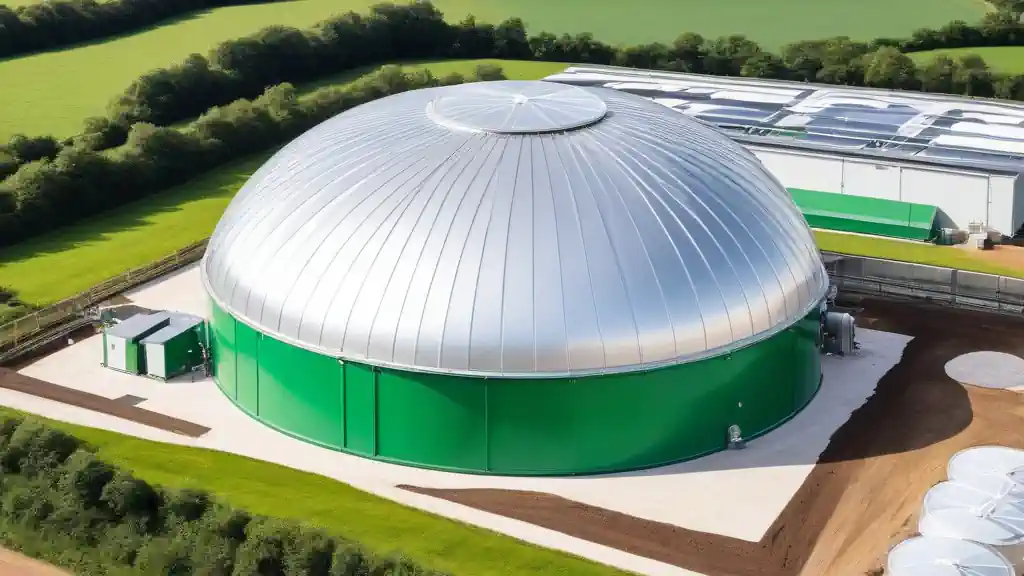
Benefits of Organic Fertilisers:
Organic fertilisers offer numerous benefits to farmers and the environment. By nourishing the soil, they help maintain its structure, moisture-holding capacity, and overall health. This, in turn, leads to healthier and more productive crops.
Sustainable fertilisers also reduce the need for excessive irrigation and synthetic pest control, resulting in significant water and energy savings. Farmers who utilize organic fertilisers often experience increased crop yields, reduced input costs, and improved profitability.
Additionally, organic fertilisers contribute to enhanced food quality and safety by reducing the presence of harmful chemicals in produce.
Italy's Organic Farming Sector:
Italy ranks among the top organic producers in Europe, with a significant number of organic farms adhering to strict cultivation and production standards.
By incorporating organic fertilisers into their farming practices, Italian farmers can further enrich their soil and enhance the sustainability of their operations. The use of organic fertilisers aligns with Italy's commitment to environmental protection and sustainable development.
Organic farming reduces reliance on chemical inputs, minimizing the use of synthetic pesticides and fertilisers that can harm ecosystems and human health.
Meeting the Growing Demand for Organic Products:
The demand for organic products in Italy and globally continues to rise as consumers become more conscious of sustainable and healthy food choices. By utilizing organic fertilisers,
Italian farmers can meet this demand, cultivate high-quality organic crops, and gain a competitive edge in the market. Organic fertilisers contribute to the preservation of biodiversity, reduction of water pollution, and conservation of natural resources.
Digestate, the physical byproduct of biogas facilities
The Value of Digestate: A Byproduct of Biogas Facilities Introduction:
Digestate is a valuable resource that is produced as a byproduct of biogas facilities. Biogas facilities utilize organic waste materials such as agricultural residues, food waste, and wastewater to produce biogas, a renewable source of energy.
During the biogas production process, the organic waste undergoes anaerobic digestion, resulting in the production of biogas and digestate.
This blog post will now explore the various applications and benefits of digestate, highlighting its role in sustainable agriculture practices and renewable energy generation.
Nutrient-Rich Organic Fertilizer:
Digestate is a nutrient-rich material that contains organic matter, nitrogen, phosphorus, potassium, and other essential elements. It serves as an excellent organic fertilizer and soil amendment, providing essential nutrients to crops and improving soil structure and fertility.
By using digestate as a fertilizer, farmers can reduce their dependence on synthetic fertilizers and contribute to sustainable agriculture practices. This not only benefits the environment but also helps in minimizing the risk of nutrient runoff and water pollution.
Enhancing Soil Health through Composting:
Digestate can also be used for composting, further enhancing its value as a soil amendment. Composting digestate helps in the decomposition of organic matter, resulting in a stable and nutrient-rich compost that can be used in horticulture, landscaping, and gardening applications. This promotes healthy soil, improves plant growth, and reduces the need for chemical fertilizers.
Utilization in Biogas Plant Operations:
In addition to its agricultural applications, digestate can be utilized for biogas plant operation and maintenance. It can be used as a feedstock for the biogas production process, ensuring a continuous supply of organic waste materials.
Furthermore, digestate can be used to generate heat and electricity through combustion or gasification processes, thereby enhancing the overall energy efficiency of biogas facilities. This not only provides economic benefits but also contributes to environmental sustainability by reducing greenhouse gas emissions and combating climate change.
Promoting a Circular Economy:
The utilization of digestate supports the concept of a circular economy, where waste materials are recycled and reused. By diverting organic waste from landfills and utilizing it for biogas production, we can reduce the environmental impact of waste disposal and promote resource efficiency. This contributes to a more sustainable future by minimizing waste generation and maximizing the use of renewable energy sources.
Rounding up on Digestate:
Digestate is a valuable byproduct of biogas facilities that offers numerous applications and benefits. Its use as a fertilizer and soil amendment supports sustainable agriculture practices, while its utilization for biogas production contributes to renewable energy generation.
Through proper management and utilization of digestate, we can promote a circular economy and work towards a more sustainable and resource-efficient future.
The NOMAD Project:
The NOMAD project is a mobile laboratory that aims to concentrate digestate, the physical byproduct of biogas facilities, and enhance its nutritional value while reducing transportation needs. Digestate has gained popularity as an organic fertiliser, but its transportation in large volumes poses challenges due to its high water content.
The NOMAD project seeks to extract biofertilizer from solid leftovers by filtering them and subjecting them to selective electrodialysis treatment for nutrient recovery. This innovative technology has the potential to transform organic fertiliser production for farms, reducing the need for storage and transportation.
Benefits for Farmers:
The NOMAD project offers several benefits for farmers. By concentrating digestate and recovering nutrients, the technology can significantly reduce the need for storage and transportation, particularly for small farms in Tuscany where land supply is limited. The mobility of the NOMAD vehicle provides a viable solution for Italian farmers and agricultural associations. With further research and development, the NOMAD project could help create a more sustainable and efficient agriculture system globally.
Conclusion to “Harnessing the Potential of Organic Fertilisers in Italian Agriculture”
Italy's strong organic farming sector and commitment to sustainable practices make it well-positioned to harness the potential of organic fertilisers in agriculture. By adopting organic fertilisers,
Italian farmers can enhance crop productivity, protect the environment, and contribute to the growing demand for organic products. The NOMAD project represents an innovative approach to organic fertiliser production, offering a long-term alternative to chemical fertilisers while reducing environmental impact.
Collaboration among stakeholders, including farmers, researchers, agricultural institutions, and government policymakers, is crucial to fully realizing the potential of organic fertilisers in Italian agriculture and establishing Italy as a leader in sustainable and organic farming practices.
Greening Your Waste – How Food Waste Processing Equipment is Leading the Change
Spread the loveFind out how food waste processing equipment is leading the change to sustainable food waste processing and greening your waste. It is a hidden secret that the waste treatment technology in food waste treatment equipment and residual municipal waste equipment is very important. First, just think how much waste food these machines have to process! […]
What is a Food Waste Depackager and Separator?
Spread the love A food waste depackager and separator is a device or machine used to unpack and separate the organic part of food waste from everything else. The most beneficial option for the disposal of the organic content thereafter is to an anaerobic digestion facility. At that plant, it is used to make biogas, […]
Numerology and Stress – Numerology for a Tension Cost-free Life
Spread the loveStress and anxiety affect our mind, and also our mind affects our body. in this article, we consider Numerology and Stress and using Numerology for a tension-cost-free life. Extreme stress and anxiety cause modifications in our body chemistry and modifies our mental, physical as well as energy levels. The outcome is psychotic somatic […]
How Many Landfills Are There in the United States?
Spread the loveIn the United States, over 2,000 landfills remain active. These sites are responsible for destroying habitats for wildlife. Many are located close to homes, businesses, and public areas, and they can be identified by their stench. In addition to active landfills, there are also thousands of inactive sites across the country, including some […]
